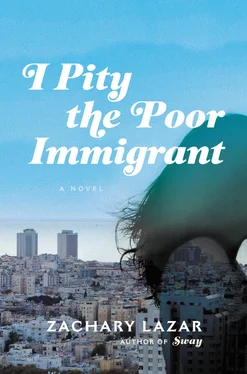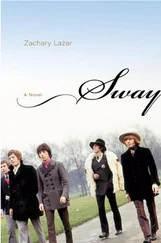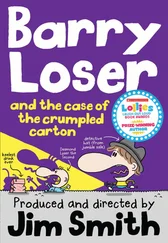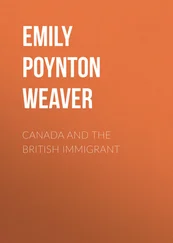Some students still lingered in the dim hallway when she came back inside. They were boys in expensive sports clothes with awkward wavy hair, the first fringes of mustache on some of their lips, aware, she guessed, of what had just happened in class. She greeted them— Mah ha’inyanim —and they looked at her and gave their rote answer, then went back to jeering about subjects she knew nothing about, from TV. She went into the bathroom and washed her face, preparing for what was next, then dried off with paper towels and glimpsed herself in the mirror — pale skin, no makeup, black hair pulled back, a few strands trailing into green eyes. She was forty-three, a Hebrew teacher. The bathroom walls behind her were the grayish pink of old hospitals. The temple had once been a movie theater, Rabbi Lehman had told her. Plastic dispensers leaked thin yellow soap onto the stainless-steel counter.
She walked down the hall to Lehman’s office. What she guessed from the solemn look on his face was that he was going to draw this out into a mournful discussion in which her only possible role could be that of noble survivor. She stood there behind the empty chair and Lehman rubbed the corner of his tired eye with a fully extended index finger. He had taken off the jacket of his three-piece suit but the vest was still on. He nodded slowly, his head turned, his hand lightly caressing his beard.
“You know what it’s like by now,” he said, still not looking at her. “The ignorance. Whatever you want to call it. This country. Our shame. Our schande. ”
“I lost my temper,” she said. “It was not a big deal.”
“Robby Karsh will apologize. You’ll apologize to Robby Karsh.” He put his hand dyspeptically over his ribs, wincing a little. “As a gesture. As a start.”
“He doesn’t have to apologize.”
“He’s an obnoxious kid. But he’s also just a twelve-year-old.”
The textbook sat on Lehman’s desk. On its cover was a blue cartoon dragon that spoke Hebrew. It had been defaced by Robby Karsh, who had drawn a swastika on the creature’s forehead. Before that, the dragon had been a figure grubby and feisty enough for the students to have embraced without question or doubt. For the past two weeks, they had all been learning Hebrew in relative calm.
“You shouldn’t have slapped him,” Lehman said. “That of course is what changes it into Max Stone teaching your classes next week.”
She turned, then consciously readjusted her hands on her thigh. She looked back down at him. “He can keep the classes,” she said.
“Gila.”
“He can keep the Nazis too. The Shoah. The holiness of it. He likes to talk about it more than I do.”
Lehman drew in a beseeching breath, as if his sympathy for her anger was fraught with risk. “Can’t we have this talk later?”
“I think we’ve already had it.”
She came back to find the girl, Hannah, waiting for her alone in the classroom. The desks were disarranged on the gray floor and there were still fragments of Hebrew letters on the blackboard, yellow flecks missed by the eraser. Gila retrieved her purse from behind the desk and the girl looked up from her Walkman, which she was tinkering with rather than listening to. Her dark hair hung in loose curls and she wore one of her father’s old dress shirts, far too large, frayed at the collar and cuffs. She appeared to be still upset — not shocked, but offended — by Gila’s outburst. It must have seemed unprovoked, slightly deranged, aimed not just at Robby Karsh but at the class in general. It must have seemed that way because that was how it had felt to Gila herself. But it had been Hannah’s fault.
“Are you ready?” Gila asked.
Hannah shrugged.
“Where’s your bag?”
“It’s in the coatroom,” Hannah said. “Where it always is. No one’s going to steal it.”
“You could have picked it up.”
“I’ll get it on the way out.”
Gila looked at the floor. “You told my story to Robby Karsh,” she said. “You must have told it to him at some point.”
Hannah’s eyes went a little narrow, a kind of thoughtful squint that often masked her actual thoughtlessness. She had the naïve brown eyes of a dog, a narrow face like something carved out of sandalwood.
“I guess Robby Karsh thought it was funny,” Gila said. “I thought you understood why I told you that story.”
The girl kept meeting her gaze with that odd thoughtful poise. Gila could see now that Hannah didn’t know why she’d repeated the story to Robby Karsh. All she knew — or sensed, gradually — was that she’d done something a little obscene, which, to Gila, seemed the inevitable result of telling such stories.
What they’d subsisted on in Bergen-Belsen, she’d told Hannah, was a watery broth made of boiled nettles — nettles, she’d explained, were a kind of weed whose leaves were said to taste somewhat like artichokes. She’d never been able to eat an artichoke, she’d told Hannah. She and her mother had had one bowl of the nettle soup to split between them each day. It was at the very end of the war, a season of typhus, overcrowding, a near total breakdown of logistics (there were no tattoos, she’d explained, not all the camps did that anyway). Her mother didn’t share the soup with the dozens of other starving women and children in their barracks, with the thousands of other starving women and children outside the barracks. To share would have been to jeopardize their own lives. Of course there was more to the story, such as how her mother had gotten the bowl of soup in the first place. Where her mother had gone when Gila waited in the little room outside the vestibule of the infirmary. What her mother had done to keep them alive. That part of the story she had not shared with Hannah.
They walked up 79 thStreet, not talking, Hannah listening to the tape player now, her duffel bag over her shoulder. Gila carried a small suitcase for their trip to the country with Hannah’s father. His store filled two high stories of a white-brick building, its windows bordered in gold, each window shaded by a monogrammed green canopy embossed with a gold letter G . Inside, pale carpets caught the light from outside and made the shop half drawing room, half museum — a Chinese horse of brown and green enamel, across the room a marble statue of Apollo. Upstairs, among the English and French furniture, a few gowns hung before tall mirrors and within the opened doors of armoires.
He was a large white-haired man in an olive-colored suit. He breathed in, as if annoyed, then said hello and Hannah turned off her Walkman.
“I need a different coat,” she said. “Everyone wears these coats now.”
“We’ll buy you a new wardrobe.”
“I don’t want a new wardrobe, I want a different coat.”
“Fiorucci. Maybe you’d like that.”
It was impossible to know if he was joking or serious. Gila stood there with her suitcase on the floor beside her, not so much as spectator but as attendant. They were fighting — this was the way they fought. Her presence here was the opposite of the Hebrew lessons, where every kind of gaze assailed her from every angle at all times. It should have been easy enough to adjust from one role to the other — visible there, not here — but the basic trick still eluded her.
They walked down to the dim garage with its office and punch clock, prices in black on the huge white sign. Groff waited for them to get into the car. The Lincoln had power locks and a leather strap you used to pull the heavy door shut. They drove down York Avenue to Sutton Place, then took 57th Street to the turnoff onto the Queensboro Bridge, Gila in back, Hannah up front beside her father, Groff staring stoically at the traffic, Gila looking into Hannah’s side mirror at the reflected skyline.
Читать дальше












